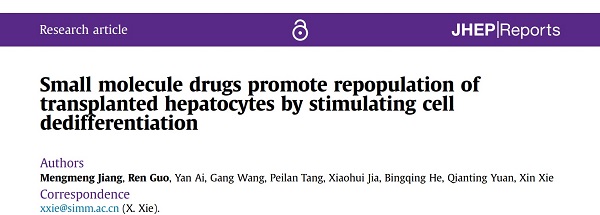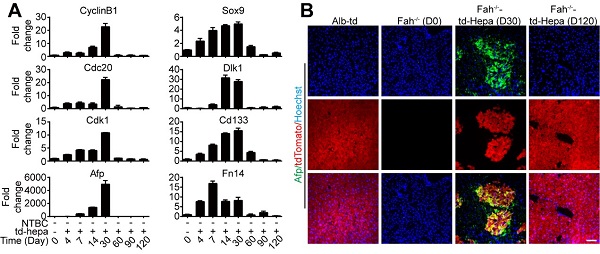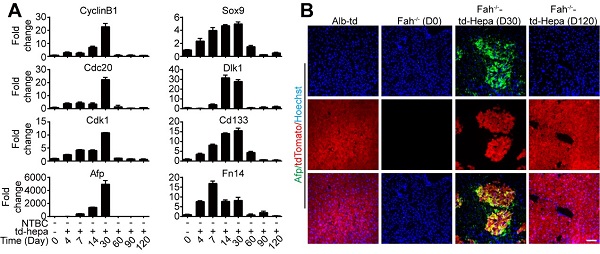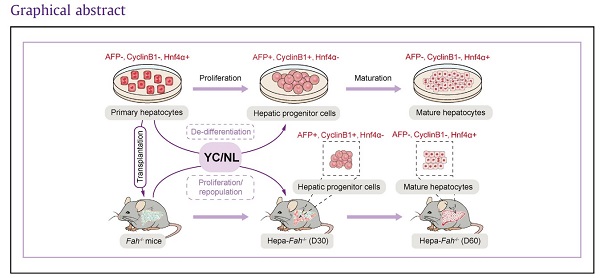Scientists Discover Small Molecule Drugs Promote Repopulation of Transplanted Hepatocytes by Stimulating Cell Dedifferentiation
Liver transplantation is so far the only known way to treat end-stage liver diseases. But liver transplantation is extremely limited by the availability of donor organs. Thus, hepatocyte transplantation emerged as a possible solution. However, an important obstacle to hepatocyte therapy is the low level of engraftment and proliferation of transplanted hepatocytes, which can not survive long enough to exert therapeutic effects. It is important to explore the mechanisms of hepatocyte proliferation in vivo and to find a way to promote the growth of transplanted hepatocytes.
In a recent study published in JHEP Reports, a team of researchers led by XIE Xin and GUO Ren from Shanghai Institute of Materia Medica, the Chinese Academy of Sciences, reported that drugs promoting hepatocyte dedifferentiation may facilitate the growth of transplanted hepatocytes in vivo and may facilitate the application of hepatocyte therapy (1).

The researchers discovered that the transplanted mature hepatocytes dedifferentiate into hepatic progenitor cells (HPCs), which proliferate and then convert back to mature state at the completion of liver repopulation (Fig.1). The scientists then hypothesized that the drugs which can promote the dedifferentiation of mature hepatocyte may promote hepatocyte proliferation and repopulation in vivo.

Fig.1 A, Quantitative RT-PCR analysis of cell cycle genes and hepatic progenitor genes in liver samples of Fah-/- mice transplanted with td-Hepa for 120 days. B, Immunofluorescence staining of Afp in frozen liver sections of Fah-/- mice before transplantation, or 30 and 120 days after td-Hepa transplantation. The liver of Alb-td mice was used as control.
After in vitro screening, the scientists found that the combination of two small molecules Y-27632 (Y, Rock inhibitor) and CHIR99021 (C, Wnt agonist) could convert mouse primary hepatocytes into HPCs (YC-iHPCs), which could be passaged for more than 30 times in vitro. YC-iHPCs maintained the capacity of differentiation into mature hepatocytes (YC-iMHs). Moreover, Y-27632 and CHIR99021 (YC) could stimulate the proliferation of transplanted hepatocytes in Fah-/- liver by promoting the conversion into HPCs (Fig. 2). Netarsudil (N) and LY2090314 (L), two clinically tested drugs which target the same pathways as YC, could also promote hepatocyte proliferation in vitro and in vivo, by facilitating HPC conversion.

Fig.2 A, Representative images of morphology, immunofluorescence staining of Sox9 and Ck19 in YC-iHPCs (P30). B, Representative images of morphology, PAS staining, co-immunofluorescence staining of Albumin and Hnf4α in YC-iMHs (P30). C, Representative tdTomato images of the whole liver (left) and frozen sections of liver (right) of td-Hepa-Vehicle and td-Hepa-YC mice (D28). D, Quantitative analysis of tdTomato positive areas in (C). E, Immunofluorescence staining of hepatic progenitor markers Afp and Dlk1 in frozen liver sections of td-Hepa-Vehicle and td-Hepa-YC mice (D28).
Taken together, this work found a new mechanism underlying the proliferation of transplanted hepatocytes, and suggested drugs promoting hepatocyte dedifferentiation may facilitate the growth of transplanted hepatocytes in vivo (Fig.3). These findings may facilitate the application of hepatocyte therapy.

Fig.3 Combination chemical cocktails YC/NL could induce mature hepatocytes dedifferentiation into HPCs, and promote hepatocytes proliferation in vivo.
1.Mengmeng Jiang, Ren Guo, Gang Wang, Xiaohui Jia, Bing Li, Qinq Zhang,Bingqing He, Qianting Yuan, Xin Xie. Small Molecule Drugs Promote Repopulation of Transplanted Hepatocytes by Stimulating Cell Dedifferentiation. JHEP Reports, doi:10.1016/j.jhepr.2023.100670 (2023)
Article link:https://www.sciencedirect.com/science/article/pii/S2589555923000010
Contact
DIAO Wentong
Shanghai Institute of Materia Medica
Chinese Academy of Sciences
E-mail: diaowentong@simm.ac.cn




